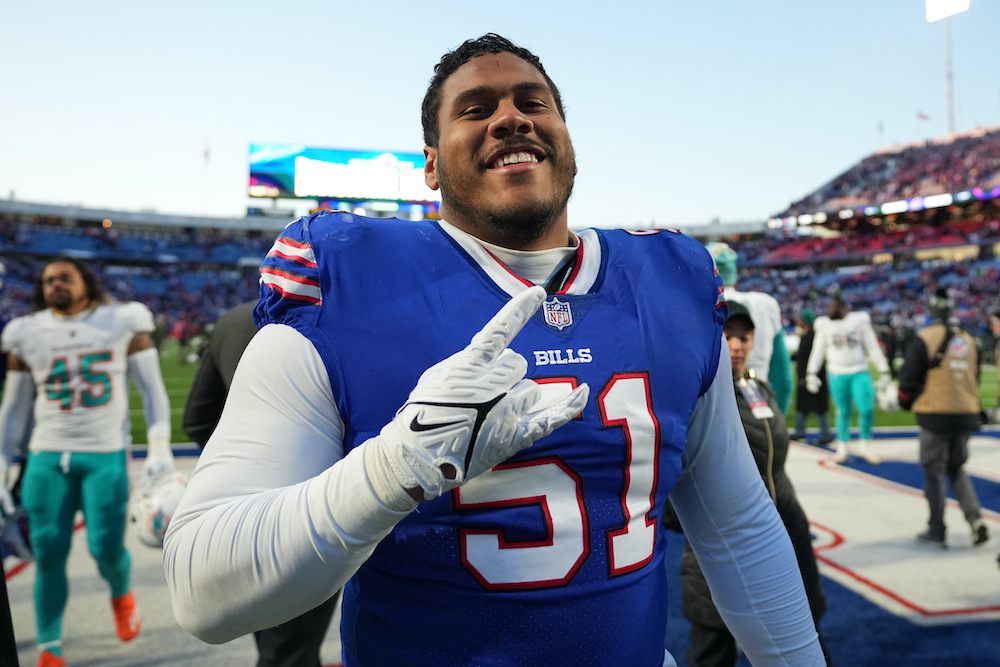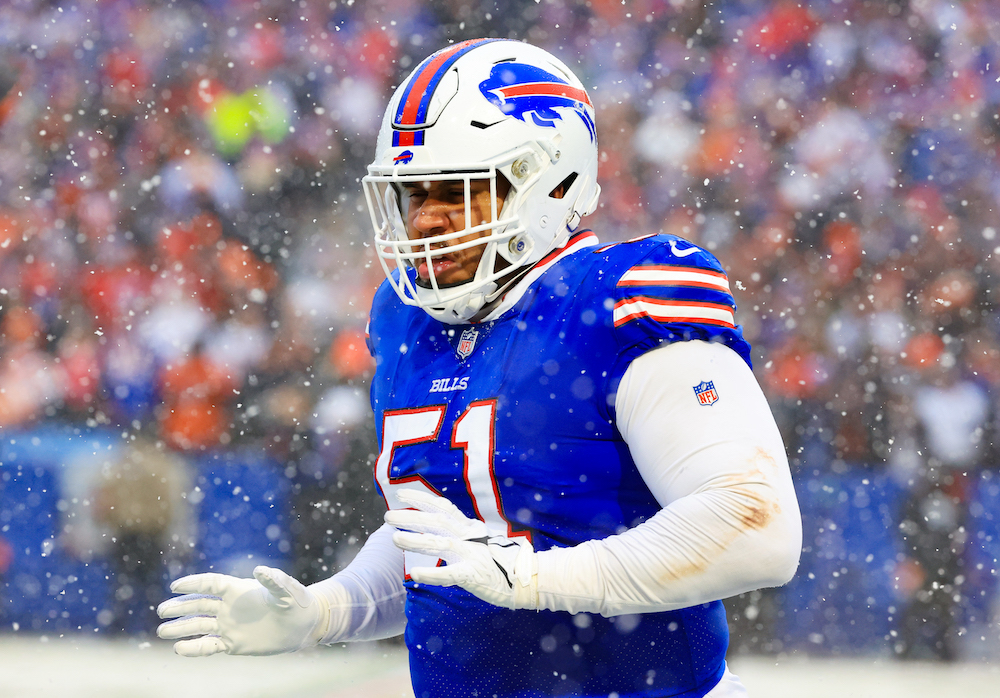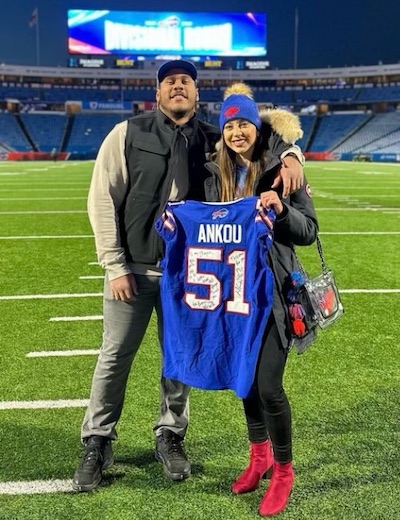
- Details
- By Ben Pryor
As much of the world’s focus is tuned to Super Bowl LVII Sunday night, defensive tackle Eli Ankou (Ojibwe) is almost indifferent when I ask him if he’ll watch the game. He probably will go to dinner and watch the game somewhere, he says. After all, it is the biggest event in football.
Don't confuse his nonchalance with a lack of seriousness about NFL football. Today, Ankou’s primary concern is on rest and recovery, his nonprofit, and continuing his upward trajectory with the Buffalo Bills.
Ankou is just one of four Indigenous athletes who had the opportunity to play in the NFL playoffs. After spending most of the year on the Bills’ practice squad, Ankou was elevated to the active roster for postseason play.
During the playoffs, he recorded two tackles against the Miami Dolphins in a 34-31 Bills win and two more tackles in a season-ending 27-10 loss to the Cincinnati Bengals.
Getting called up during the playoffs was a special moment for Ankou, and he was prepared when his name was called.
“It was a really good moment for me,” Ankou told Native News Online. “I spent most of the season being hurt or being in the background until my name got called up. But when that moment came … my coach asked me how I was feeling, how my body felt, and how my mind felt. There was no doubt in my mind — I would go out and do exactly what I was coached to do.”
Ankou is a sixth-year veteran in the league and has played for five NFL teams since graduating from UCLA. His is a career spotlighted by determination in the face of calf and hamstring injuries.
“For me, it was all (about) confidence,” Ankou said. “I was just ready to go when the time came. At this point, those pregame jitters just become different. When you’re younger, you’re a little nervous and trying not to mess up, trying to make sure everyone can trust you. But I'm at a point in my career where I feel trusted by my teammates. I do feel trusted by the coaches. And it was just a matter of going out and executing that.”

Ankou’s execution in the playoffs and his persistence in the 2022 season no doubt played a role in a new contract with the Buffalo Bills on February 7th that will keep him with the team all of next year.
In comparing the differences between college football and the NFL, many will notice the difference in the speed and the power of the game. Everyone has a certain skill set that has brought them to the league.
One factor largely ignored is just how long the season is. For Ankou, some of the game’s mental aspects are often overlooked and something he prides himself in.
“You have to find a way to mentally lock in and tell yourself that you’re gonna have to get your body and get your mind through all those weeks,” Ankou said. “And for me, it’s just being able to repeat that to myself through positive reinforcement. Some positive self-talk. My mind is my biggest tool. And I’ve gone through pretty much anything you can imagine in terms of a pro player facing some sort of adversity.”
Those moments have been instrumental in developing his character and helping him emotionally process the day-to-day strain of the season.
Ankou’s off-season plans include letting his body rest from the workload it takes during the season.
“The next step is to get the muscles and my brain firing again, getting those (football) movements back, and reinforcing my body,” Ankou said. “After that, it’s pretty much filled with strength. Build the power and build my mental resolve.”
Ankou’s Indigenous ancestry plays an essential role in his success. He is conscious of the fact that there are only a handful of Native players in the NFL. That opportunity to inspire and represent the Native community is something he relishes.
Ankou’s grandmother is Ojibwe, from the Dokis First Nation in Ontario. He grew up in Canada, then moved to the U.S. during his senior year of high school. Growing up, Ankou's mother prioritized implementing Indigenous qualities in his youth by keeping him engaged with Native culture as a child.
“Whenever I step out on the field, I always think about my grandmother, my grandfather, and all my grandparents,” Ankou said. “But I feel like I'm carrying something with me, and I have a responsibility to put my best foot forward because there’s not many of us out there.”
After achieving his dream of playing in the NFL, Ankou sought opportunities to empower future Native generations and support issues near and dear to his family.
 PHOTO: In 2019, Ankou and his fiancée, professional cyclist Shayna Powless (Oneida), started a non-profit called the Dreamcatcher Foundation. (Photo: Shayna Powless)In 2019, Ankou and his fiancée, professional cyclist Shayna Powless (Oneida), started a non-profit called the Dreamcatcher Foundation.
PHOTO: In 2019, Ankou and his fiancée, professional cyclist Shayna Powless (Oneida), started a non-profit called the Dreamcatcher Foundation. (Photo: Shayna Powless)In 2019, Ankou and his fiancée, professional cyclist Shayna Powless (Oneida), started a non-profit called the Dreamcatcher Foundation.
The foundation hosts youth sports camps and raises awareness for the Missing and Murdered Indigenous Women and Girls crisis.
“One of our main objectives is to host camps with a focus on football and cycling near Native reservations so that Native children have easy access to participate and hopefully become inspired to live healthier, more active lives,” Powless said.
As well, the foundation works to support families that are facing hardships — whether financial, spiritual or social. Last year, the Dreamcatcher Foundation donated 100 bikes and helmets to Native youth.
Ankou hopes his story is one that Native children can use as a blueprint to reach their potential and goals.
“I want to show kids – whoever they are – they can do it too,” Ankou said. “If you give yourself a chance, if you work for it, you know you can, you can pretty much do anything. It doesn't have to be just football, but I think football is a great conduit for me to express that. Anytime I step out onto the field, I carry that responsibility of showing others that you know, they can do something great, and I don't live a single day in my life with regret.”
This message is something he carries with him daily.
“I try to put my best forward every day, put a smile on my face, and just get to work and appreciate the good and the bad,” said Ankou.
“All of that stuff that comes along with it," he adds. "It’s just a blessing to be able to express myself and to represent my community in that way and kind of give the younger generation some sort of blueprint to be able to do whatever they want.”
Ben Pryor (Choctaw) is a contributing writer to Native News Online and freelance writer for several other national and regional publications. A graduate of Oklahoma State University, his writing interests include politics, the environment and sports.
Help us tell the stories that could save Native languages and food traditions
At a critical moment for Indian Country, Native News Online is embarking on our most ambitious reporting project yet: "Cultivating Culture," a three-year investigation into two forces shaping Native community survival—food sovereignty and language revitalization.
The devastating impact of COVID-19 accelerated the loss of Native elders and with them, irreplaceable cultural knowledge. Yet across tribal communities, innovative leaders are fighting back, reclaiming traditional food systems and breathing new life into Native languages. These aren't just cultural preservation efforts—they're powerful pathways to community health, healing, and resilience.
Our dedicated reporting team will spend three years documenting these stories through on-the-ground reporting in 18 tribal communities, producing over 200 in-depth stories, 18 podcast episodes, and multimedia content that amplifies Indigenous voices. We'll show policymakers, funders, and allies how cultural restoration directly impacts physical and mental wellness while celebrating successful models of sovereignty and self-determination.
This isn't corporate media parachuting into Indian Country for a quick story. This is sustained, relationship-based journalism by Native reporters who understand these communities. It's "Warrior Journalism"—fearless reporting that serves the 5.5 million readers who depend on us for news that mainstream media often ignores.
We need your help right now. While we've secured partial funding, we're still $450,000 short of our three-year budget. Our immediate goal is $25,000 this month to keep this critical work moving forward—funding reporter salaries, travel to remote communities, photography, and the deep reporting these stories deserve.
Every dollar directly supports Indigenous journalists telling Indigenous stories. Whether it's $5 or $50, your contribution ensures these vital narratives of resilience, innovation, and hope don't disappear into silence.
 The stakes couldn't be higher. Native languages are being lost at an alarming rate. Food insecurity plagues many tribal communities. But solutions are emerging, and these stories need to be told.
The stakes couldn't be higher. Native languages are being lost at an alarming rate. Food insecurity plagues many tribal communities. But solutions are emerging, and these stories need to be told.
Support independent Native journalism. Fund the stories that matter.
Levi Rickert (Potawatomi), Editor & Publisher
